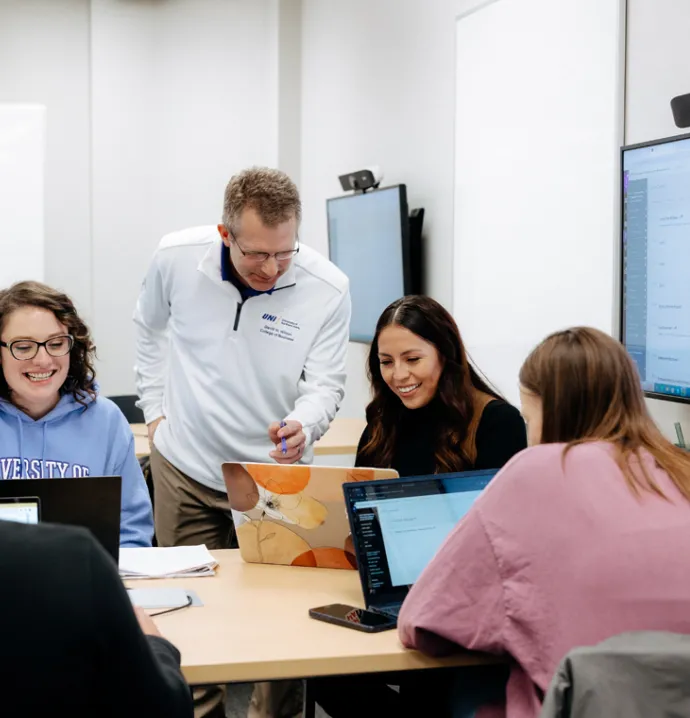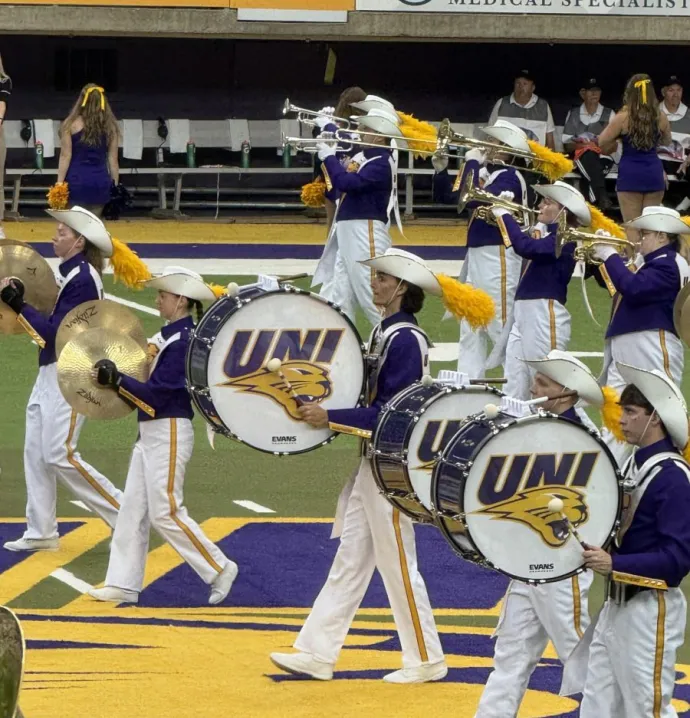Construction program booms
Construction program booms
Aaron Brown, a UNI senior who serves as president of the university’s construction management club, is weighing three job offers — and he won’t even graduate until December.
“I’ve worked as an intern for five companies in the past three-and-a-half years,” said the 21-year-old native of Johnston, Iowa. “And this past year, everyone in our [construction management] club had an internship.”
In fact, construction industry leaders flock to the UNI club’s yearly job fair and golf outing to scout for hires. UNI is the sole university in Iowa that offers a four-year degree in construction management.
The program is booming, doubling in size in the last five years, but is still growing to meet workforce demands.
“I’ve had 15 to 20 recent job opportunities that I can’t fill because students already have jobs lined up nine months before they graduate,” said Chris Shaw, recruitment coordinator and academic advisor for UNI’s Department of Technology, under whose aegis the construction management program operates.
The UNI Technology Department is also set for a huge upgrade when it moves into a renovated and expanded building — a $42 million project projected to open in August of 2024.
An ongoing national construction boom, $60-70,000 starting salaries and a curriculum change that makes it easier for community college students to earn their four-year construction management degree at UNI have contributed to the technology-driven program’s growth. It’s also the first program in the state to be accredited, earning that distinction in 2010.
An advisory council, comprising alumni and construction management professionals, has also drawn students who want to ensure they’re getting cutting-edge knowledge from industry professionals.
“Having the advisory council is a key to success,” said Jim Kiesey, (‘98) past co-chair and incoming chair of UNI’s construction management advisory board and senior director of operations at Estes Construction.
“That’s where we can give feedback on trends, emerging software and yet ensure that we don’t lose the power of collaboration that students experience with the closeness and cohesiveness of the smaller construction management classes at UNI,” said Kiesey, who was graduated with a bachelor’s in construction management and a minor in general business concepts.
Construction managers must deftly juggle a building’s cost, scope, safety, schedule and quality, along with technical savvy and daily communications with architects, engineers, contractors, subcontractors and project owners.
UNI’s curriculum combines lectures with hands-on lab work. It includes topics such as cost estimating, mechanical and electrical systems, and scheduling the intricacies of the work.
“You’re not looking at a construction site saying, ‘What’s that?’” Kiesey said of students when they start work in the industry.
Brown, the UNI senior, said students built a tiny home in one of his lab-based classes, and the combination of in-class and internship experiences cemented his career choice. Brown started working in the field in a co-op program in his senior year in high school.
Shaw’s work to align UNI’s curriculum with two-year programs common at local community colleges. Those Associate’s in Applied Science (AAS) degrees are typically considered non-transferable degrees, but UNI’s construction management program welcomes them, Shaw said.
“I travel to every community college district in the state,” Shaw said. “Students are seeing that they can go to a two-year program and make a $40,000 to $45,000 starting salary or continue at UNI and start with a $60,000 or higher starting salary. The U.S. Bureau of Labor Statistics is predicting an 8 percent increase in construction management jobs over the next 10 years.”
Kiesey, Shaw and Brown agreed in separate interviews that the construction management club’s networking opportunities with professionals give students field experience and insight into the value of customer service — skills vital in today’s environment.
“Today, we have drone footage, paperless job sites, people leveraging iPads while they walk at the job site, and cameras that take 360-degree scans and stitch them together so the customer can see the construction’s progress in a self-guided virtual tour,” Kiesey said. “And Building Information Modeling (BIM) lets you see a building three-dimensionally, so it’s much more efficient. Materials are prefabricated and you can see whether the schematics work — like whether the ductwork will interfere with the sprinkler piping. Everyone knows where the installation is supposed to go.”
At the same time, “concrete is still concrete,” Kiesey said, and UNI’s timeless value lies in its small classes and students’ ability to build relationships with their professors. Kiesey recalled when he was a member of the UNI construction management club as a student, “collaboration on assignments accelerated the power of collective IQ.
“How do you get along? How do you work with people who are generally like-minded, but not? How do you socialize an idea and develop boardroom savvy? How do you approach an issue to get the best outcome you’d like?” Kiesey said. “That’s extremely valuable experience as you work through the curriculum. That’s been extremely valuable and served me well throughout my career.”
Brown said his internships have given him exciting experiences working on the Iowa State Capitol building, a cancer center’s concrete radiation rooms, a wood-framed retirement home community, a Blue Cross Blue Shield building that his father built, and in his current work with Turner Construction, helping construct a data center in Altoona, Iowa.
“I’ve gone from working on a $10 million project to a multiple-billion-dollar project,” he said. “It’s insane to be a part of — and cool to be able to put all of that experience together.”




